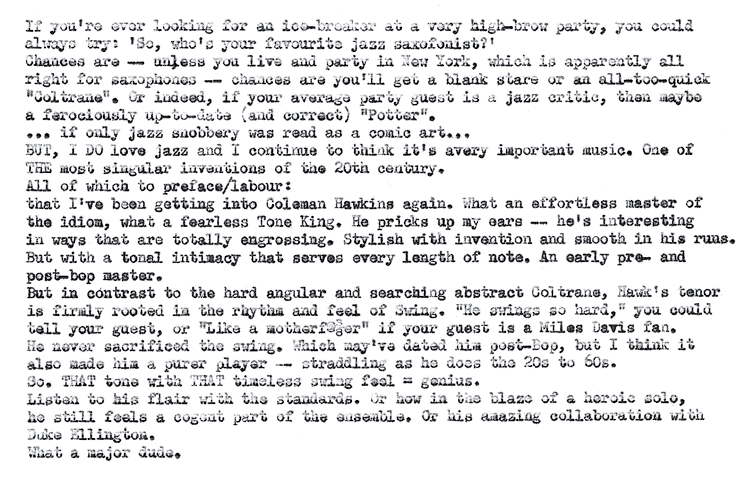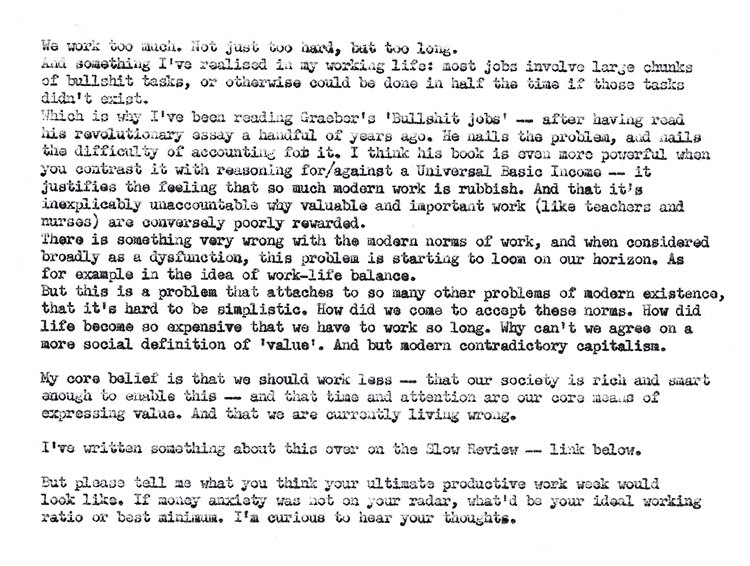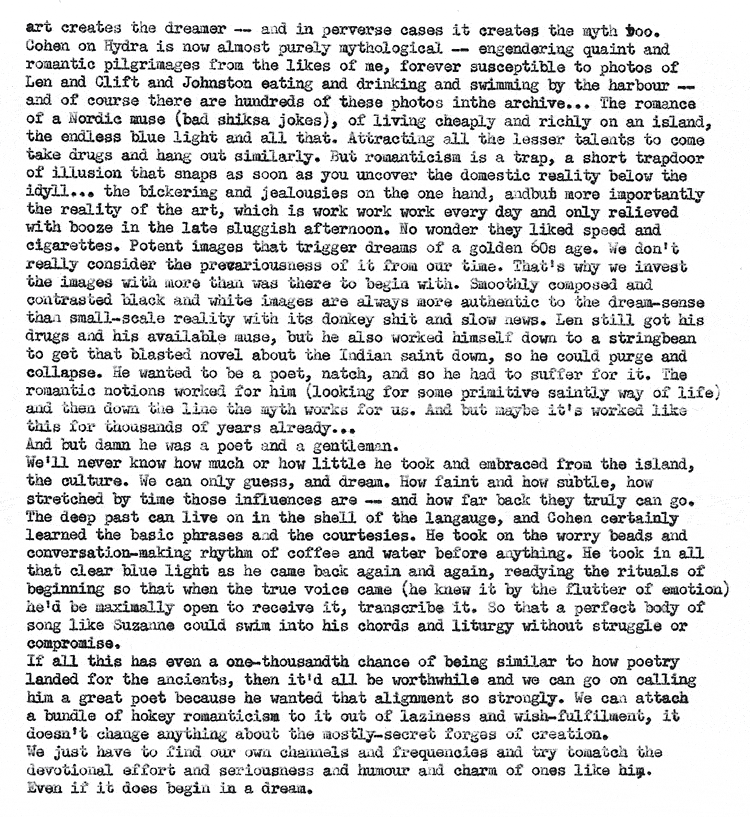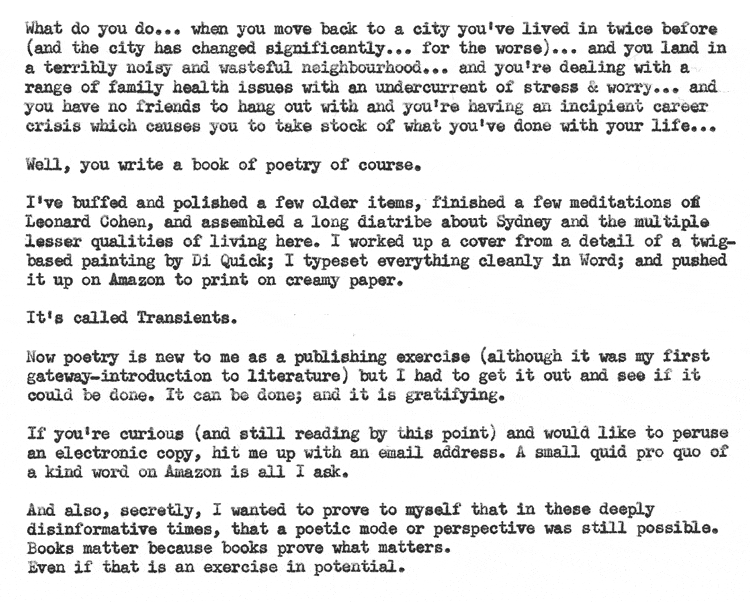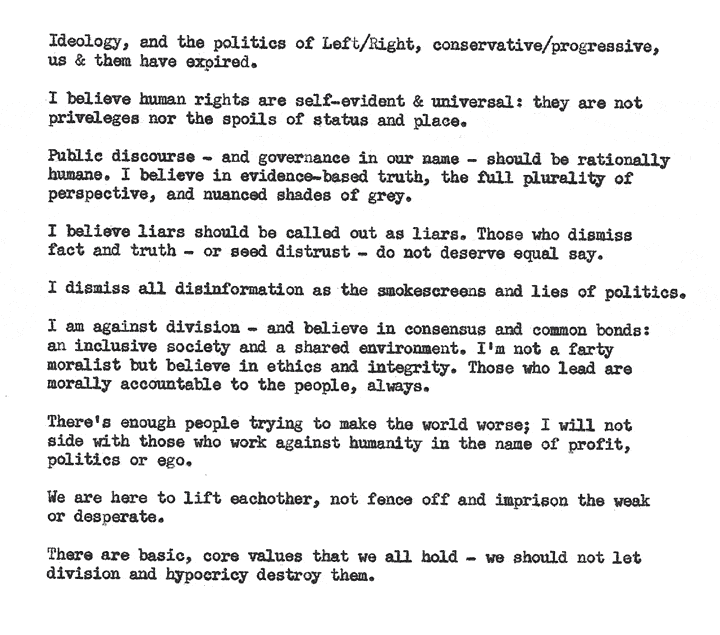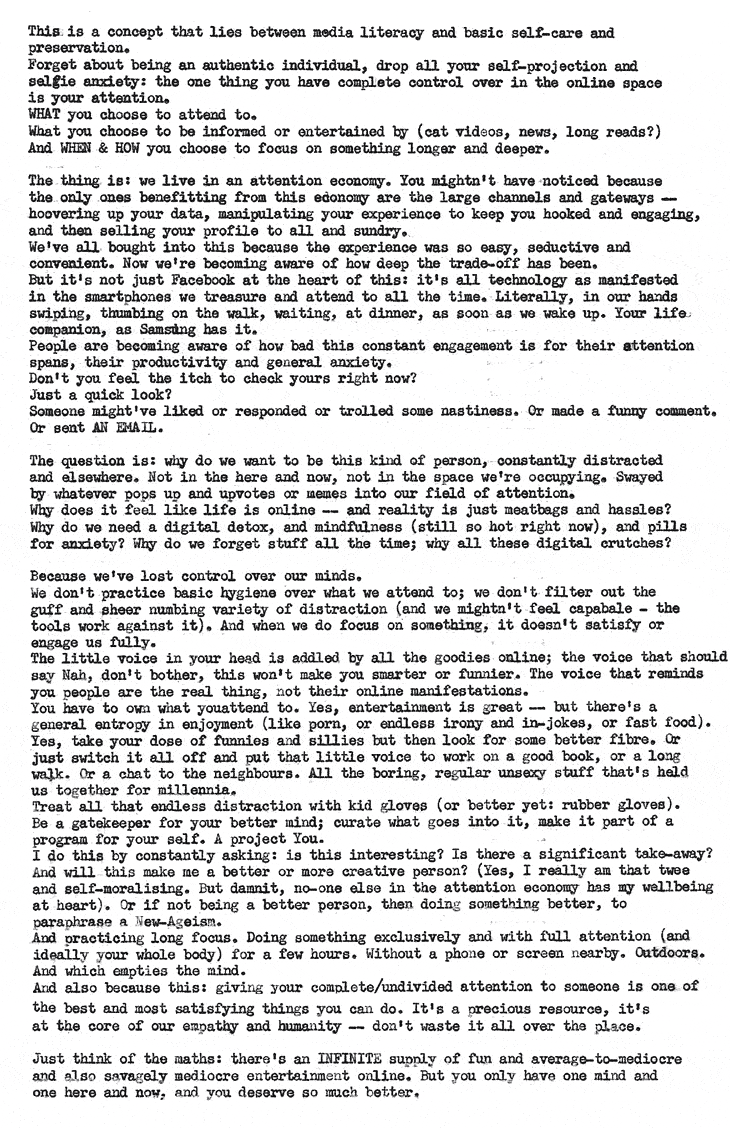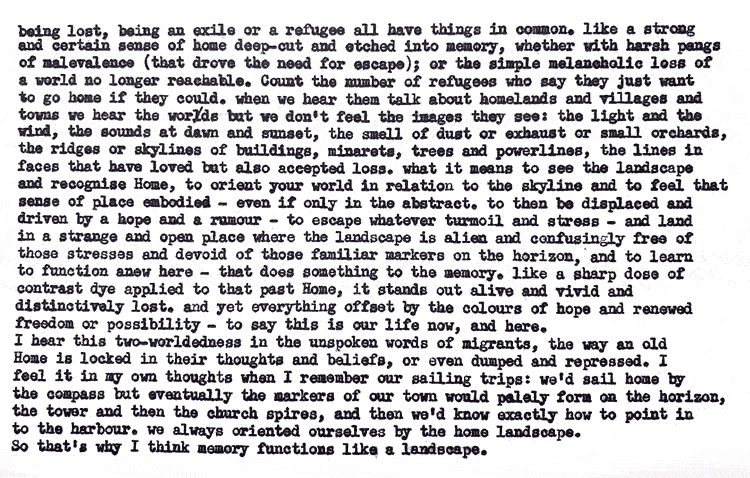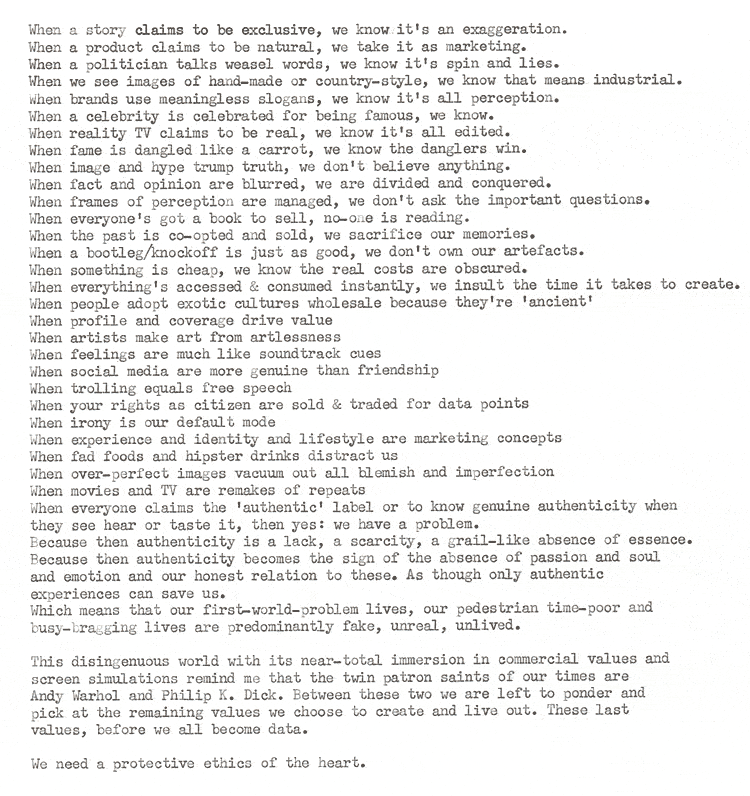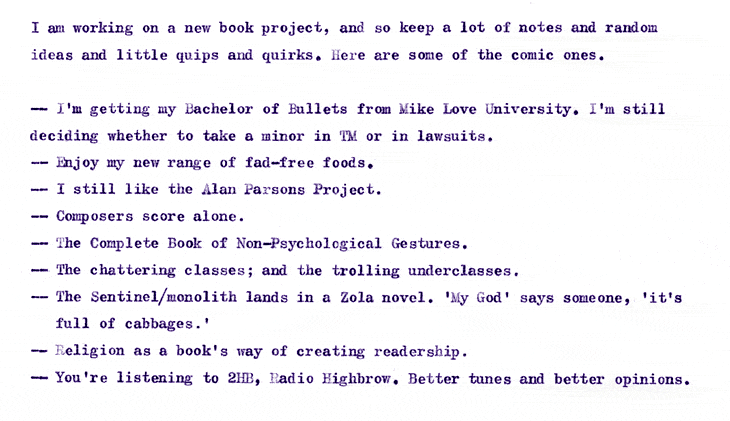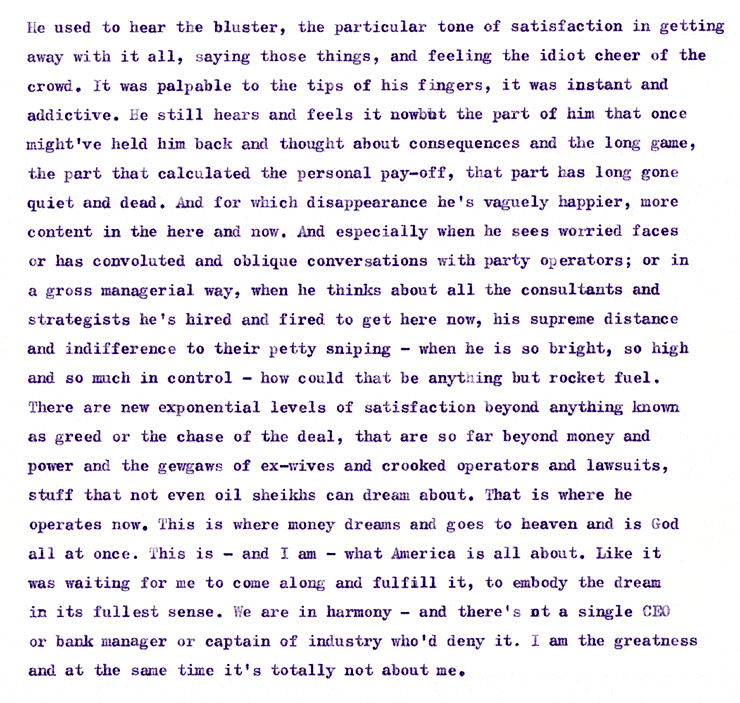The long slow {typecast} blog
Is there anything more beautiful than a handsomely typed page?
Tuesday
Saturday
Work less to avoid the bullshit of work
>> 10HH: the work-life revolution
{Also, yes, my ribbon is getting a bit patchy. It'll make more sense at the above link.}
Sunday
Obs from the COVID lockdown (& after)
The COVID-19 outbreak happened, but it didn't happen equally. The thing I've found interesting is how different countries, and different styles of political leadership have handled the pandemic. When you combine variations in geography, urban density and planning, it's astounding that some countries deliberately chose an ad-hoc approach to infection control. That some countries had no effective leadership at all, or a bumbling version of autocratic belatedness. That some acted powerless as the virus spread and tore through their less privileged communities. That some leaders played the pandemic for political pinpoints.
It's shown how uneven the global condition is, and that neither countries or (often) their states could coordinate or work towards a consistent and effective outbreak response. Borders were shut down, jurisdictions closed, and leadership defaulted en masse. Hospital managers were left to source their own protective equipment.
Which kind of makes a mockery of the 'global village' and the smart/connected/globalised society and frictionless marketplace we've been trumpeting for the last decades.
COVID-19 has shown up how unequal our societies are, how profoundly uncoordinated. You could also say it showed how depressingly deep we live in the capitalist model and mindset. How people's self-interest caused shortages of all kinds. How price gauging leapt in response. How much we previously depended on shopping and holidays and consumption for validation and identity. And how fragile these habits and industries are when faced with genuine collective threat. How it doesn't reward the things we value, but instead seeds value in commercial things.
See this in the well-off people escaping the city for their coastal holiday homes. See it in the collapse of the AirBnB market which condoned landlord profiteering over the fair provision of rental housing stock. See in in the mass lay-offs and collapse of companies that somehow survived on the thinnest margins of profitability. See it in the entire arts industry pretty much shutting down. See it in the pervasive casualisation of labour from the gig economies to the primary care and service industries. Same story: politicians do not value the providers of essential work.
See it in the broad lack of social support and planning for downturns or major events. See it in universities overexposed to the overseas student market, suddenly cutting their already-casualised workforce in half (at least they have nice gold-plated buildings left over). See it in the tech industries profiting from disinformation and the spread of lies that work against the health of whole nations. Need I go on...
Oh yes: see it in the power of political lobbying, where privileged industries (like builders) get massive bailouts and incentives which also happen to benefit the rich landlord voter base. Whilst legitimate needs (like social and affordable housing in Australia), are ignored. Now, granted, Australia did introduce a generous and temporary support measure. But not everyone works with fair employers.
But when these are withdrawn it'll show up clearly that the system doesn't work, and doesn't work equally for all. It'll show up the ongoing varieties of inequality in our societies. As America is experiencing now.
I find it interesting to see how precarious and un-agile the modern economic system is. Capitalism is not robust and it certainly isn't sustainable -- but gee it's nice to take a sabbatical from it every now and then.
More and more sectors are clamouring for support. The government won't be open to indulging all of them; but it will find new excuses for austerity. It will not plan for the future.
A pandemic that affects all of us has not been experienced the same way. Some countries like New Zealand pulled together through sympathetic and effective leadership. Some people stayed and worked from home, luckily. Some people faced enormous risk doing the only job they could, for organisations that had to stay open. Some people went out regardless and chose to ignore social distancing, and some people got very sick.
Add to which the virus itself does not affect all people in the same way.
Maybe it should be called the Inequality Virus, for all that it's shown up in our society.
It's certainly shown up how poor some nations are at acting collectively. Or more damningly: how fragmented, disenfranchised and divided our societies have become in the connected/digital age, that an ultimately containable virus could wreak such havoc. See it in how disinformation and untruths spread virally.
Maybe we should re-word William Gibson's famous dictum, to say that reality is unevenly distributed.
(Don't get me wrong: the vast majority of people adhered to lockdown and social distancing measures. This has been the core of many nations' recovery success. Sensible people seeing through bullshit and maintaining their common sense).
Rather than a New Normal, I think we need a thorough revaluation of how we want to live. To live better and fairer and sustainably, in such a way that important jobs get remunerated properly, and socially negative ones don't. We cannot live with so may conflicting and unequal versions of reality.
And maybe, rather than this sickly favouring of privileged sectors when there are hundreds of legitimate calls for support, we need to just get over it and sign on for a Universal Basic Income. Tax the industries that make and take the most but pay the least; and distribute that money to all the people equally. No questions, just a bottom line of basic support. All it takes is leadership and the vocal will of the people.
Wednesday
Leonard Cohen was an island (part 1)
So, inevitably,our mountain village addresses a valleyand Mediterranean bay.The water’s blue attenuatesand blurs the broader lines—disturbed horizon, skies erased.There is no border, only hue —reminding me of Hydra and Cohen landed there.Romanticism maybe —a key, a house, an island;ten years of intensitywith loving, drugs and song.A novel or two, thenthrow your typer in the sea.‘Bohemian’ we say;but he found some ancient sense,a drawing basic pilgrimage,a riddling on this island too.Alignment with the mode of mythexpressed in depth and lightthat rinsed Homeric eyesin time, those eyes, all time.Cohen was a poet after all,he was simply tuningthose older iterations.A mode of search perhaps, desire:what you see you then become.In this light,what here can be envisionedis not that far removed:the past becomes the now,the myth ascends the muse.(Cyprus 2017)
Leonard Cohen was an island (part 2)
I now know whyhe chose an island of the blue:it wasn’t for easeor cheap squid and retsina.Callings are quiet voicesthat barely move a thought of breathin apprehension.Sense must arise from telling vagueness,a murmur in the line of sight.Blue print of primitive life,where primitive means to live by faith.White stone and horseshoe harbourthe set and setting for hunger,and the ascetic who follows the wine.Everted exile: chosen, designed.All that mythic seriousness, yes,though his laughter wasn’t a choicebut the deepest agreementwith the natural ordering.A diaspora of onehe used a liturgy of wordsto mark the end of desire in song.(Curious concept;it didn’t last long.)
Sunday
What's wrong with Australia (brief but corrective list)
This is a corrective list to contrast the lifestyle positives, and not exhaustive. I'm focusing on the major problems. But notice how many of these problems have their source in politics: what Australia suffers most from is a system and culture of government that explicitly does not want to improve or better the nation, that shuns humanity and consensus, and dismisses the future: status quo Australis.
Saturday
Tuesday
Attention hygiene
Also available in handy digital format on Medium.
Friday
On politics without vision [updated]
Politics in our age is not defined by leadership or intelligence, but by bumbling incompetence. It's my default interpretation for why it goes wrong so often, and so spectacularly. As though it's regressing or degenerating somehow, in every sense of the term.
My feeling is that if you want to be a moral, effective and productive person in society today, you're more likely to succeed by doing and thinking the exact opposite of what our leaders say and do.
When we should have trustworthy and principled leaders with vision, we instead have media-egos, moral hypocrites working to their 'base' or party-room bottom line, or to thinly veiled corporate/industrial interests.
Let me reiterate that the politicians in power do not have a vision. They see as far as the news cycle only. They are managers of spin and message, locked in a PR bubble that drones with buzzwords, dog whistles and polls.
They are not the custodians of our future. They can't articulate — let alone imagine — what Australia could look like in five or ten years, and establish some guiding principles to make that happen. They can barely manage the fiscal aspects of government.
They are not the productive enablers of society's improvement — and by that I mean everyone's improvement, not just the privileged few.
Or look at Brexit (bumbling), Trumpism (insane incompetence), Barnaby Joyce (staggering hypocrisy*). Let's not talk about the streak of populism (government by the ignorant for the ignorant) or harmful conservatism**.
Let's not talk about our offshore prison camps. Our significant energy problem. The cost of living and stagnant wages. Housing unaffordability. Lack of civic planning. Incompetent infrastructure development. The environment, jobs, our waste problem.
I just want a clear and fair vision to align with, that respects consensus and our basic humanity, so that we can rally to solve these problems, and not just 'manage' them away. I don't mean an ‘ideology’ as of old, nor an 'image' - I mean a vision.
Australia can be and deserves so much better.
* (Just) one example of Barnaby Joyce's condescending, paternalistic hypocrisy*** - in a scandal that had numerous gaffes and trainwrecks - the headline says it all:
From the full Hansard (worth a read for its thick conservatism):
*** For context: Barnaby (deputy prime minister then), espouses conservative family values, voted against the marriage equality bill; Barnaby had an extramarital affair with a staffer, who then got pregnant and which made huge media waves when the story broke (it was an open secret in Parliament); Barnaby is leaving his wife and family to be with said staffer, made a complete hash of her career (and privacy and dignity), claims these are all strictly private matters in several interviews (one of which is a top 5 all-time trainwreck in itself), then says he's not sure of the baby's paternity... and keeps the story front and centre for weeks. This man has no awareness (ie completely tone deaf in the #MeToo era), has an out-of-control ego, is paternalistic and disrespectful to all the women in his life... this man doesn't see there's a problem with all this... This man has a classic manproblem. As well as just being a bumbling fool.
My feeling is that if you want to be a moral, effective and productive person in society today, you're more likely to succeed by doing and thinking the exact opposite of what our leaders say and do.
When we should have trustworthy and principled leaders with vision, we instead have media-egos, moral hypocrites working to their 'base' or party-room bottom line, or to thinly veiled corporate/industrial interests.
Let me reiterate that the politicians in power do not have a vision. They see as far as the news cycle only. They are managers of spin and message, locked in a PR bubble that drones with buzzwords, dog whistles and polls.
They are not the custodians of our future. They can't articulate — let alone imagine — what Australia could look like in five or ten years, and establish some guiding principles to make that happen. They can barely manage the fiscal aspects of government.
They are not the productive enablers of society's improvement — and by that I mean everyone's improvement, not just the privileged few.
Or look at Brexit (bumbling), Trumpism (insane incompetence), Barnaby Joyce (staggering hypocrisy*). Let's not talk about the streak of populism (government by the ignorant for the ignorant) or harmful conservatism**.
Let's not talk about our offshore prison camps. Our significant energy problem. The cost of living and stagnant wages. Housing unaffordability. Lack of civic planning. Incompetent infrastructure development. The environment, jobs, our waste problem.
I just want a clear and fair vision to align with, that respects consensus and our basic humanity, so that we can rally to solve these problems, and not just 'manage' them away. I don't mean an ‘ideology’ as of old, nor an 'image' - I mean a vision.
Australia can be and deserves so much better.
* (Just) one example of Barnaby Joyce's condescending, paternalistic hypocrisy*** - in a scandal that had numerous gaffes and trainwrecks - the headline says it all:
'A grey area': Barnaby Joyce raises doubts over whether he's the biological father of Vikki Campion's babyNow hear Barnaby in 2012: "The closer that mother and father figure is to the genetic make-up of the child, the better it is."
From the full Hansard (worth a read for its thick conservatism):
...fathers matter... a study in the Journal of the American Academy of Child and Adolescent Psychiatry in 2006 found that living in a broken home at age eight increases the chances of children committing criminal offences in late adolescence. These findings are confirmed by a study in the Journal of Pediatrics, which found that children and families without a father are more likely to be in fair or poor health.** Whose 'vision' is usually retrograde or isolationist or both.
...this is not a statement that every child who is in a broken home ends up in poor health or ends up with a criminal record. It is not saying that at all. It is just talking about the realities of the probabilities. Stability in structure that confirms and reaffirms both a mother and father figure is the best environment for a child to grow up in—and, the closer that mother and father figure is to the genetic make-up of the child, the better it is.
*** For context: Barnaby (deputy prime minister then), espouses conservative family values, voted against the marriage equality bill; Barnaby had an extramarital affair with a staffer, who then got pregnant and which made huge media waves when the story broke (it was an open secret in Parliament); Barnaby is leaving his wife and family to be with said staffer, made a complete hash of her career (and privacy and dignity), claims these are all strictly private matters in several interviews (one of which is a top 5 all-time trainwreck in itself), then says he's not sure of the baby's paternity... and keeps the story front and centre for weeks. This man has no awareness (ie completely tone deaf in the #MeToo era), has an out-of-control ego, is paternalistic and disrespectful to all the women in his life... this man doesn't see there's a problem with all this... This man has a classic manproblem. As well as just being a bumbling fool.
Sunday
Saturday
Wednesday
Thursday
Sunday
Thursday
Brisbane demolition: O'Reilly's Bonded Stores and Hotpoint House
http://brisbaneheritage.org.au/category/the-bonded-stores/
http://brisbaneheritage.org.au/a-glimpse-inside-the-bonded-stores/
Tuesday
The collapsing feeling of self-publishing
[Note: I tried giving this article away. One particular place, the *blog* of the Queensland Writer's Centre — that is, a centre supporting writers — passed on it. Now, if you can't get a blog to accept your work, then you've been insulted. I present it below for you instead.]
The publishing industry has changed, but very little has changed. Maybe I should be more specific and say the publishing process has changed, that the overall model of what's possible has opened up so that it's both more accessible and cheaper to produce books — especially outside of the regular old channels — in digital or print. Anyone can get into the magic of books; which is a minor revolution, I'd say.
But what hasn't changed? Look at the bookshop window displays: lots of colourful books; lots of diversity. If you think about it, the books on display and reviewed in newspapers, journals and magazines are still largely, or rather almost all, representative of the standard publishing model. By which I mean the large (consolidated, international) publishing houses and the medium trade presses, the industry players.
The window display — our window on publishing — says the industry is healthy because there's so much great stuff being produced. There's familiar and prize-winning authors, authors who can't not get published; there's non-fiction and biographies by the dozen, profile-leveraging tie-ins, young adult and bright fantasy. Now and then a renegade success story, a blockbuster everyone reads on planes or whenever they're not looking at their phone, because everyone else is.
The publishing industry has changed, but very little has changed. Maybe I should be more specific and say the publishing process has changed, that the overall model of what's possible has opened up so that it's both more accessible and cheaper to produce books — especially outside of the regular old channels — in digital or print. Anyone can get into the magic of books; which is a minor revolution, I'd say.
But what hasn't changed? Look at the bookshop window displays: lots of colourful books; lots of diversity. If you think about it, the books on display and reviewed in newspapers, journals and magazines are still largely, or rather almost all, representative of the standard publishing model. By which I mean the large (consolidated, international) publishing houses and the medium trade presses, the industry players.
The window display — our window on publishing — says the industry is healthy because there's so much great stuff being produced. There's familiar and prize-winning authors, authors who can't not get published; there's non-fiction and biographies by the dozen, profile-leveraging tie-ins, young adult and bright fantasy. Now and then a renegade success story, a blockbuster everyone reads on planes or whenever they're not looking at their phone, because everyone else is.
Subscribe to:
Posts (Atom)

